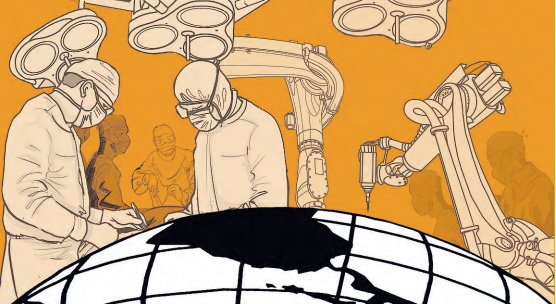

In sub-Saharan Africa, millions face a life-altering reality: a simple fracture or infection, which could be treated through routine surgery, often goes untreated, resulting in lifelong disability—or worse.
As I prepare to attend the Africa Tech Festival happening next week in Cape Town I am drawn to the fact that today, technological advances off er a path forward, yet without dedicated partnerships, training, and advocacy, many in underserved communities may never benefit from these life-saving solutions.
One powerful example of what’s possible comes from Shamim Nabuuma Kaliisa, founder of the Chil Femtech Centre and a cancer survivor herself.
Shamim has transformed cancer care for low-resource communities using AI-driven solutions, providing more than 150,000 women with access to automated cancer diagnostics and online oncology services.
Her work shows that innovation can bring healthcare to even the most remote regions.
But beyond inspiring examples, we must recognise the broader systemic changes needed to make these advances truly accessible and sustainable.
Robotic-assisted surgery, once a futuristic concept, is now a reality.
These systems have transformed surgery in high-income countries, but in low-resource settings, considerable hurdles remain: prohibitive costs, technical training requirements and limited infrastructure.
Without solutions for these challenges, such technology risks remaining out of reach.
One promising approach is to design modular, cost-effective robots specifically for resource-limited settings, combined with hands-on training for local surgeons.
Partnerships between tech innovators, government bodies and local providers are essential to bridge this gap.
By investing not only in the technology but also in the people who will use it, we can pave the way for equitable access to advanced surgical care.
Artificial intelligence is reshaping surgical training and education, offering real-time insights and performance feedback.
However, AI in healthcare brings its own ethical considerations.
Data privacy is paramount, especially in regions where data protection frameworks may be underdeveloped.
Moreover, the risk of algorithmic bias is a serious concern: AI models trained predominantly on data from high-income settings may not be optimised for diverse populations, leading to disparities in care.
Ensuring ethical use of AI in healthcare means developing localised datasets and rigorous oversight of algorithmic performance.
Remote surgery, where specialists can guide procedures from afar, holds enormous promise for isolated communities.
Imagine a specialist in Johannesburg assisting a general surgeon in rural Uganda through a robotic interface.
But reliable telecommunications infrastructure is essential, as are clear protocols for remote collaboration.
Without these, such technology cannot succeed on a broad scale.
Technology alone cannot create long-term change without empowering local healthcare workers.
Training and mentorship programmes are essential for equipping local teams to operate and maintain advanced equipment.
Strong partnerships across governments, tech companies and healthcare organisations are essential for empowering local surgeons and health workers to use these technologies independently, bridging the healthcare gap in a sustainable way.
While these innovations offer exciting potential, their long-term success hinges on sustainable funding, supply chain stability and local commitment.
A surge in donor funding often provides initial resources, but without ongoing investment, these programmes risk stalling.
True sustainability means developing long-term financing mechanisms, such as national health funds, to support advanced surgical care and maintenance of the technology itself.
While technology offers solutions, advocacy is what makes them actionable.
We need strong advocacy to secure ongoing funding, drive policy changes and make equitable healthcare a priority for governments and stakeholders.
Without it, these groundbreaking innovations risk remaining out of reach for those who need them most.
NICHOLAS OKUMU
Orthopaedic surgeon and a 2024 Global Surgery Advocacy Fellow


 © The Star 2024. All rights reserved
© The Star 2024. All rights reserved